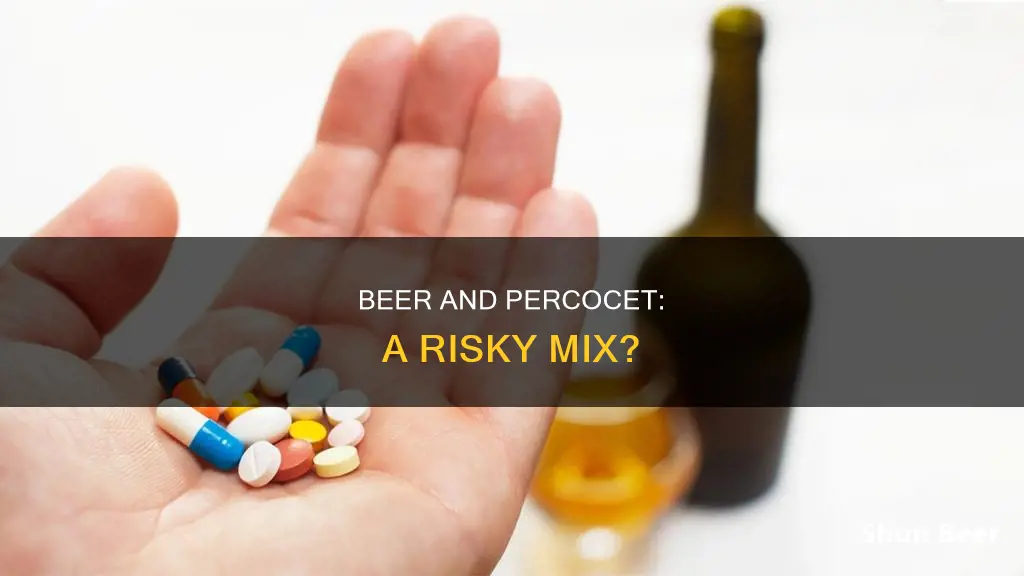
Mixing alcohol with prescription drugs is never a good idea, and Percocet is no exception. Percocet is a brand name for a prescription pain-relieving drug that combines oxycodone, an opioid, with acetaminophen, which is Tylenol. Oxycodone is highly addictive, and mixing it with alcohol can be extremely dangerous, slowing your heart rate and breathing, and causing unconsciousness, respiratory failure, coma, brain damage, and even death. Even a moderate amount of alcohol combined with a single Percocet pill can put you at risk of respiratory depression, a form of suffocation that can quickly lead to brain damage and death.
| Characteristics | Values |
|---|---|
| Should you drink beer with Percocet | No |
| Why | Mixing alcohol and Percocet can result in severe respiratory depression, which could result in irreversible injury and/or death |
| Both alcohol and Percocet can slow breathing, impair judgment and coordination, and be toxic to the liver. These hazards are amplified when the two are taken together | |
| Mixing alcohol and Percocet can cause irreversible liver damage if consumed excessively or over a long period of time | |
| Mixing alcohol and Percocet increases the risk of an opioid overdose, leading to unconsciousness, slowed heart rate, respiratory failure, coma, brain damage, and death | |
| Percocet is a Schedule II prescription drug combining oxycodone (an opioid painkiller) with acetaminophen (better known by its brand name, Tylenol) | |
| Alcohol is a central nervous system (CNS) depressant that works by slowing down parts of the brain and inducing feelings of relaxation and intoxication | |
| Mixing alcohol and Percocet can make addiction worse | |
| Mixing alcohol and Percocet can increase the potential for hepatotoxicity (liver poisoning) |
What You'll Learn
- Mixing alcohol and Percocet can lead to irreversible liver damage
- Combining the two can increase the risk of opioid overdose
- It can cause slowed or stopped breathing, which may result in death
- Drinking alcohol while taking Percocet can lead to irregular heart rate
- Mixing the two can increase the risk of addiction

Mixing alcohol and Percocet can lead to irreversible liver damage
Mixing alcohol and Percocet can have serious health consequences, including irreversible liver damage. This is because both substances are toxic to the liver, and the risk of hepatotoxicity (liver poisoning) increases when they are combined.
Percocet is a prescription painkiller that combines oxycodone, an opioid, with acetaminophen, also known by the brand name Tylenol. Oxycodone is a semi-synthetic opioid drug manufactured from an opiate precursor substance found in the opium poppy. It is prescribed to treat moderate to severe pain. Opioids like oxycodone are highly addictive and can lead to compulsive misuse, increasing the risk of addiction, overdose, and death.
Acetaminophen, on its own, can also produce serious adverse effects when consumed at high doses. It has been associated with cases of acute liver failure that sometimes result in liver transplants or death. When people exceed a certain dose of acetaminophen, the liver may become overwhelmed and struggle to metabolize the substance. This risk is further exacerbated when alcohol is consumed simultaneously.
Alcohol is a central nervous system (CNS) depressant that slows down parts of the brain, inducing feelings of relaxation and intoxication. It is the most commonly abused drug in the United States, with 6% of the population suffering from alcohol use disorder. When combined with oxycodone, the effects of alcohol are amplified, making individuals "drunker" than they would be from drinking alcohol alone. This increases the risk of injury, especially when operating a vehicle.
The combination of alcohol and Percocet can also cause profound sedation, decreased heart rate and blood pressure, slowed or stopped breathing, unconsciousness, coma, and potential death. The risk of an opioid overdose is also increased, which can lead to respiratory failure, brain damage, and death.
In summary, mixing alcohol and Percocet can lead to irreversible liver damage due to the toxic effects of both substances on the liver. It can also increase the risk of other serious side effects, including overdose and death. Therefore, it is strongly advised to avoid consuming alcohol while taking Percocet.
Beer and Pregnancy: Can Drinking Beer Impact Tests?
You may want to see also

Combining the two can increase the risk of opioid overdose
Combining alcohol and Percocet can be extremely dangerous and even life-threatening. Both substances can slow breathing, impair judgment and coordination, and be toxic to the liver. When combined, these effects are amplified, and the risk of an opioid overdose increases significantly.
Percocet is a prescription opioid that combines oxycodone, a powerful opioid painkiller, with acetaminophen, commonly known by its brand name, Tylenol. Oxycodone, like alcohol, is a central nervous system (CNS) depressant. It slows down the brain's neural pathways, affecting functions like balance, memory, judgment, and coordination. Alcohol has a similar effect, slowing down parts of the brain and inducing feelings of relaxation and intoxication.
When alcohol and Percocet are mixed, the impact on the body and mind is heightened. The combination can lead to profound sedation, decreased heart rate and blood pressure, slowed or stopped breathing, unconsciousness, coma, and even death. The risk of liver damage is also significantly increased when these substances are combined. Acetaminophen, one of the components of Percocet, can cause serious liver injury when consumed in high doses, and this risk is amplified when mixed with alcohol.
The risk of overdose is further heightened by the addictive nature of both substances. The "high" or euphoria caused by oxycodone and alcohol is achieved by stimulating the production of dopamine and serotonin, the "feel-good" hormones. Over time, the brain's reward center becomes less responsive to these substances, leading to drug tolerance and the need for higher doses to achieve the same effects. This can result in addiction and an increased risk of overdose.
Additionally, the intoxicating effects of alcohol and Percocet can impair judgment and memory, leading to accidental overdose. Individuals may forget they have taken a Percocet dose and take another, or they may mix the two substances without realizing the dangers. This underscores the importance of avoiding alcohol entirely while taking Percocet, even if it is just one beer.
In conclusion, combining alcohol and Percocet can have severe consequences, including a heightened risk of opioid overdose. It is crucial to refrain from consuming alcohol while taking this medication to avoid potentially fatal outcomes.
Low-Carb Diet and Beer: Is It Possible?
You may want to see also

It can cause slowed or stopped breathing, which may result in death
Combining alcohol and Percocet can have serious consequences. Both substances can slow breathing, impair judgment and coordination, and be toxic to the liver. However, the most significant danger of mixing the two is the increased risk of slowed or stopped breathing, which can lead to respiratory failure and even death.
When alcohol and Percocet are mixed, they can result in profound sedation, decreased heart rate and blood pressure, slowed or stopped breathing, unconsciousness, coma, and death. The biggest health risk of combining these substances is slowed respiratory drive, which can lead to irregular, shallow, or stopped breathing. Without immediate medical treatment, oxygen deprivation can quickly cause brain injury, which may be fatal.
The risk of slowed or stopped breathing is especially high when Percocet is mixed with alcohol due to the effects of both substances on the respiratory system. Alcohol, like opioids, slows down a person's breathing. When the body has to withstand the effects of both drugs, the respiratory system may be overwhelmed, leading to respiratory depression, a condition characterised by minimal or no breathing. This form of suffocation can quickly cause brain damage and death if left untreated.
The combination of alcohol and Percocet can also increase the risk of an opioid overdose, which can lead to unconsciousness, slowed heart rate, respiratory failure, coma, brain damage, and death. An opioid overdose occurs when opioid receptors in the brain are overstimulated by excessive amounts of opioid drugs, causing vital functions like breathing to slow down. This can result in slowed breathing and respiratory depression, where carbon dioxide levels increase in the body while oxygen levels fall, leading to fainting, slowed heart rate, respiratory failure, and potentially death.
In conclusion, mixing alcohol and Percocet can cause slowed or stopped breathing, which poses a significant risk of severe respiratory depression and even death. It is crucial to avoid combining these substances due to the serious health risks involved.
Drinking Beer on Texas Streets: What's Legal?
You may want to see also

Drinking alcohol while taking Percocet can lead to irregular heart rate
Drinking alcohol while taking Percocet can have serious consequences. Both substances carry their own set of risks and side effects, but when combined, they can create a host of new negative reactions. One of these is an irregular heart rate.
Percocet is a prescription pain-relieving drug that combines oxycodone, a semi-synthetic opioid, with acetaminophen, which is an over-the-counter non-opioid pain reliever. Oxycodone is derived from an opiate precursor substance found in the opium poppy. It is prescribed to treat moderate to severe pain. Opioids like oxycodone attach to and activate specific receptors in the brain, inducing feelings of pleasure and reducing pain sensations. Oxycodone can also affect balance, coordination, and reflexes, and cause impaired memory, judgment, and concentration.
Alcohol is a central nervous system (CNS) depressant that works by slowing down parts of the brain, inducing feelings of relaxation and intoxication. It can also slow the brain's neural pathways, making it harder for the brain to coordinate functions like balance, memory, speech, and judgment. This can lead to unsteady walking, blurred vision, slurred speech, slowed reaction times, and impaired memory and judgment.
When combined, Percocet and alcohol amplify each other's effects, making the user "drunker" and "higher" than they would be with either substance alone. This can be deadly, increasing the risk of injury, especially when driving. The combination can also lead to profound sedation, decreased heart rate and blood pressure, slowed or stopped breathing, unconsciousness, coma, and death.
In addition, both substances are associated with liver damage, and the risk of hepatotoxicity (liver poisoning) increases when they are used together. This is because the liver struggles to break down both acetaminophen and alcohol when they are consumed simultaneously, leading to a buildup of hepatoxic metabolites and oxidative stress, which can cause liver damage.
Mixing alcohol and Percocet can also increase the risk of addiction and overdose. The combination can make it difficult to remember the last dose of medication, leading to overuse of one or both substances. It can also increase the risk of both opioid overdose and alcohol poisoning, which can be fatal.
Overall, drinking alcohol while taking Percocet can lead to a range of serious side effects, including irregular heart rate, and it is important to avoid mixing these substances to reduce the risk of harmful consequences.
Drinking Beer in Your Front Yard: Legal or Not?
You may want to see also

Mixing the two can increase the risk of addiction
Mixing alcohol and Percocet can have serious consequences, including an increased risk of addiction. Both alcohol and oxycodone, one of the two drugs that make up Percocet, are central nervous system (CNS) depressants. CNS depressants slow down parts of the brain, inducing feelings of relaxation and, in the case of alcohol, intoxication.
Oxycodone and alcohol also cause feelings of euphoria by stimulating the production of the "feel-good" hormones dopamine and serotonin. By acting on the reward centre of the brain, both drugs can make users feel more relaxed, less inhibited, and "happier". The problem is that the brain's reward centre becomes less and less responsive to alcohol and oxycodone over time, a phenomenon known as drug tolerance. This means that higher and higher doses of the drugs are required to achieve the same effects. Addiction is a common consequence of this process.
Taking alcohol and oxycodone together can amplify the intoxicating effects of both substances, leading to impaired coordination and judgment, and increasing the risk of injury to yourself and others. This is especially true if you are behind the wheel of a car. In addition, impaired judgment can make it difficult to remember the last dose of medication, leading to accidental overdose.
There is also evidence that alcohol use increases the likelihood and effects of opioid addiction, and that people who abuse alcohol and opioids are less likely to respond to substance abuse treatment.
Breastfeeding After a Beer: Is It Safe?
You may want to see also
Frequently asked questions
No, you should not drink alcohol while taking Percocet. Mixing alcohol and Percocet is very dangerous and can result in severe respiratory depression, which could result in irreversible injury and/or death.
Both alcohol and Percocet can slow breathing, impair judgment and coordination, and be toxic to the liver. These effects are amplified when the two are taken together, increasing the risk of addiction, overdose, or liver damage.
The side effects of Percocet can range from mild to severe and may include drowsiness, sedation, nausea, vomiting, dizziness, lightheadedness, and dysphoria.







